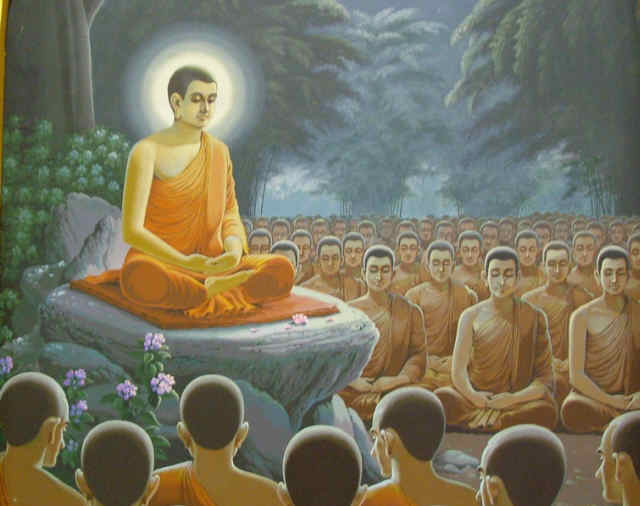-
You Are Responsible Comment May 16, 2015 -
Lovthuru budu samide Comment May 16, 2015The Buddha did not teach about the mind and its psychological factors so that we’d get attached to the concepts. His sole intention was that we would recognize them as impermanent, unsatisfactory and not-self. Then let go. Lay them aside. Be aware and know them as they arise. This mind has already been conditioned. It’s been trained and conditioned to turn away and spin out from a state of pure awareness. As it spins it creates conditioned phenomena which further influence the mind, and the proliferation carries on. The process gives birth to the good, the evil, and everything else under the sun. The Buddha taught to abandon it all. Initially, however, you have to familiarize yourself with the theory in order that you’ll be able to abandon it all at the later stage. This is a natural process. The mind is just this way. Psychological factors are just this way. ~Ajahn Chah
-
Loving-Kindness Comment May 16, 2015 -
Avoid Evil Comment May 16, 2015Neither for the sake of oneself nor for the sake of another should one do wrong, not even for the sake of acquiring wealth, kingdom or children, should one do wrong. Such a one is indeed virtuous, wise and righteous.
~Sayings of the Buddha, Ven. Dr. K. Sri Dhammananda
-
Life is dear to all Comment May 16, 2015 -
Kitty and a rabbit Comment May 15, 2015A cat and a rabbit really can be friends. A cat who lives with a house rabbit might still stalk and chase a rabbit he met outdoors. The environmental cues would set the instinct in motion. In fact, he might even pursue his own rabbit-friend if they encountered each other outdoors. There are two lessons here. The first is to make sure you set up a situation where Felix is unlikely to feel predatory. The second is that even if Daphne has a feline friend, she could still be terrorized by an unfamiliar cat. Source: House Rabbit Society
-
Things might not always be easy going Comment May 15, 2015So what if everything blew up in your face, at least you were trying something new to see what would happen. Those that stick to what they know and don’t try new things or attempt new goals are living a very limited experience. If things are getting tough it’s likely because you’re venturing into new areas and getting out of your comfort zone. This is a good place to be and will help you get the most out of life. Keep making those experiments. Things might not always be easy going, and you it might sometimes look like a disaster, but on one attempt you’ll get it right. Tinker, tinker. Source: Bright Drops
-
When things aren’t going as you planned Comment May 15, 2015If you’ve been worried about how the future will turn out because things aren’t going as you planned, this is a good life lesson: you can create the future you want, which immediately helps you stop worrying about it. By creating your future rather than fearing it you regain the element of control and stop looking at yourself as the victim of things that are happening to you. They say the future is unknown, and largely it is, but you can do things today that will influence your tomorrows, and that makes today a very powerful thing indeed. Source: Bright Drops
-
Kitty is too sleepy to play with baby chicks Comment May 15, 2015Chickens have full-color vision—no color-blindness here! Who likes to sunbathe? Apparently everyone—humans, cats, dogs, and chickens too! You can’t blame them, and they don’t even need sunscreen. Chickens know who’s boss—they form complex social structures known as “pecking orders,” and every chicken knows his or her place on the social ladder. Source: Peta
-
When we sit in meditation Comment May 15, 2015When we sit in meditation we want the mind to become peaceful, but it’s not peaceful. Why is this? We don’t want to think but we think. It’s like a person who goes to sit on an ants’ nest: the ants just keep on biting him. When the mind is the world then even sitting still with our eyes closed, all we see is the world. Pleasure, sorrow, anxiety, confusion – it all arises. Why is this? It’s because we still haven’t realized Dhamma. If the mind is like this the meditator can’t endure the worldly dhammas, he doesn’t investigate. It’s just the same as if he were sitting on an ants’ nest. The ants are going to bite because he’s right on their home! So what should he do? He should look for some poison or use fire to drive them out.
But most Dhamma practitioners don’t see it like that. If they feel content they just follow contentment, feeling discontent they just follow that. Following the worldly dhammas the mind becomes the world. Sometimes we may think, ”Oh, I can’t do it, it’s beyond me,”… so we don’t even try. This is because the mind is full of defilements, the worldly dhammas prevent the path from arising. We can’t endure in the development of morality, concentration and wisdom. It’s just like that man sitting on the ants’ nest. He can’t do anything, the ants are biting and crawling all over him, he’s immersed in confusion and agitation. He can’t rid his sitting place of the danger, so he just sits there, suffering. ~Ajahn Chah

















